Who Backs Opponents and Supporters of Constructing Nuclear Power Plant in Kazakhstan
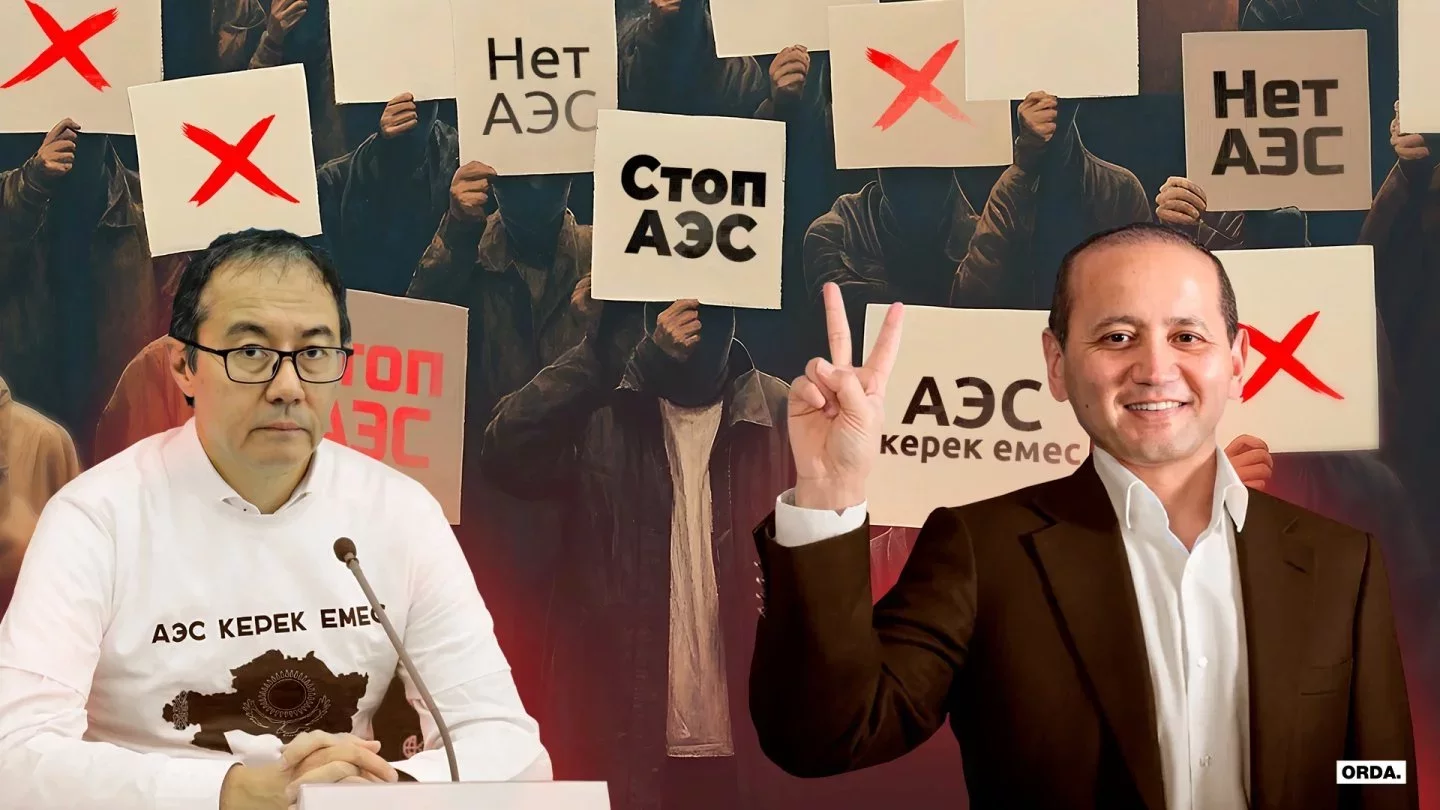
In less than a month, Kazakhstanis will decide in a referendum whether to build the country's first nuclear power plant. Opponents and supporters campaign, acting as the "voice of the people." Orda.kz journalists investigated how organized and independent these groups are.
AGAINST
Prior to the president's announcement of the referendum date, public hearings on the construction of the nuclear power plant were held in all major cities. Orda.kz correspondents noticed that certain people appeared at the hearings in different regions. However, the idea of public discussions was to learn the residents' opinions in each specific region.
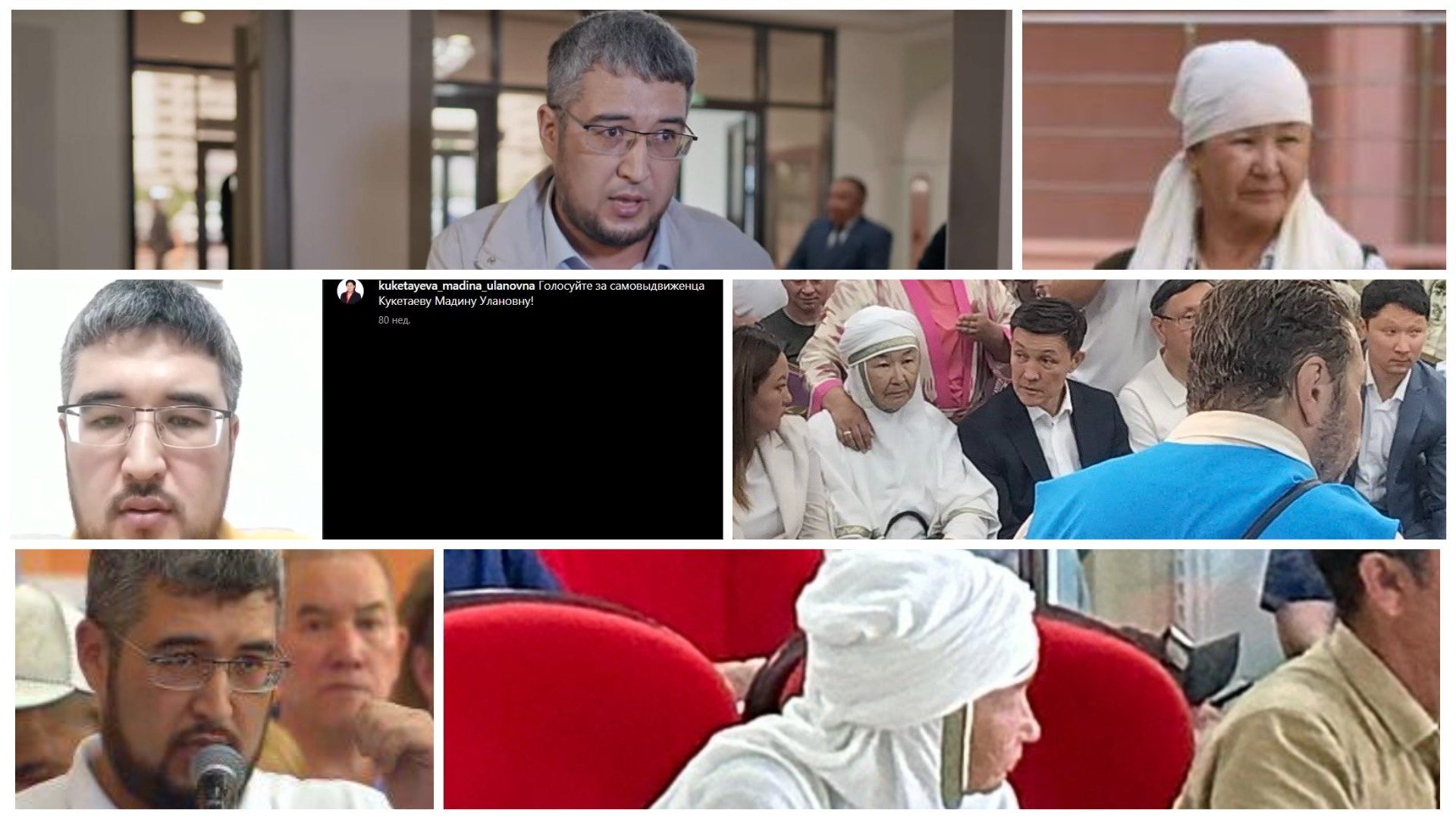
They all had one thing in common — active protests against nuclear power plant construction. Some tried to disrupt scientists and energy specialists, as transpired at the discussions in Almaty.
Using photo search engines, we discovered that the same people were speaking out against the NPP in Almaty and Taraz, and we noticed some of them in a photo from a year ago from the village of Ulken.
In several photos, we have identified Yernar Rakhimzhanov, an activist from Almaty who positions himself as a real estate expert. He was at the public discussions in Astana. This is just one example. The motives are unknown.
Who are all these people? Ideological loners with spare time and money to travel around Kazakhstan or a coordinated group?
One For All...
In a photo from a public hearing in Almaty, we noticed a woman whom search engines identified as Madina Kuketayeva. She has attempted to run for the Majilis as an independent candidate. On her Instagram page, Kuketayeva published videos with activists who campaigned for her. One was the above-mentioned Yernar Rakhimzhanov.

Another supporter of Kuketayeva caught on video is Elvira Bekzadina. While searching for information about her, we found a group on Telegram called “Stop NPP.” By coincidence, Elvira Bekzadina is also a group administrator and a member of the unregistered political party “Alğa, Qazaqstan!”
The other administrators are Amangeldy Dzhakhin, Mereke Nugmanov, and Alina Smakova. They also turned out to be “Alğa, Qazaqstan!” members.
The main coordinator of the Stop NPP community is the current leader of “Alğa, Qazaqstan!” Amangeldy Dzhakhin. His number is registered in the Telegram group. He also actively participates in the NPP opponents' events. In early September, Dzhakhin, Elvira Bekzadina, and another “Alğa, Qazaqstan!” activist, Sergey Izmailov, held a press conference against the construction of the nuclear power plant.
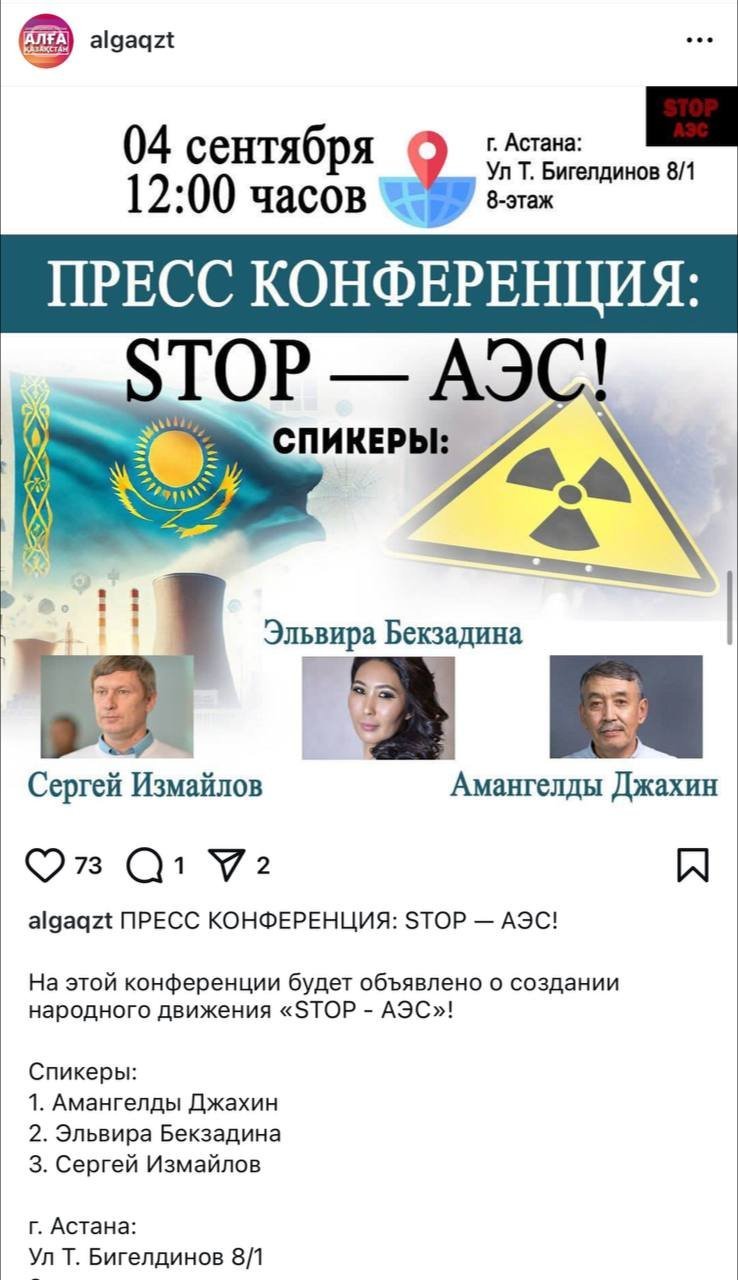
The “Alğa, Qazaqstan!” activists do not hide their affiliation. However, they do not explain whether their movement is connected with the gatherings against the nuclear power plant, and they come to public hearings without party paraphernalia that could allow them to be identified. This may be because “Alğa, Qazaqstan!” is officially banned.
Meanwhile, the "Stop the Nuclear Power Plant" group has seen relative success. Its participants grew from about 390 to more than a thousand in a couple of days.
Who Benefits?
At public hearings in Almaty, a group of activists against constructing the nuclear power plant practically forced energy specialist Aset Nauryzbayev to speak. He was not listed as such. Nauryzbayev, the former KEGOC head, is the most visible public opponent of nuclear energy in Kazakhstan.
Aset Nauryzbayev is a former subordinate and business partner of Mukhtar Ablyazov. In 1998, he replaced Ablyazov as KEGOC president. In the 2000s, Nauryzbayev was on the international wanted list in a case related to the abuse of official authority in privatizing Yekibastuz GRES-2. It is worth noting that many similar cases in Kazakhstan are politically motivated.
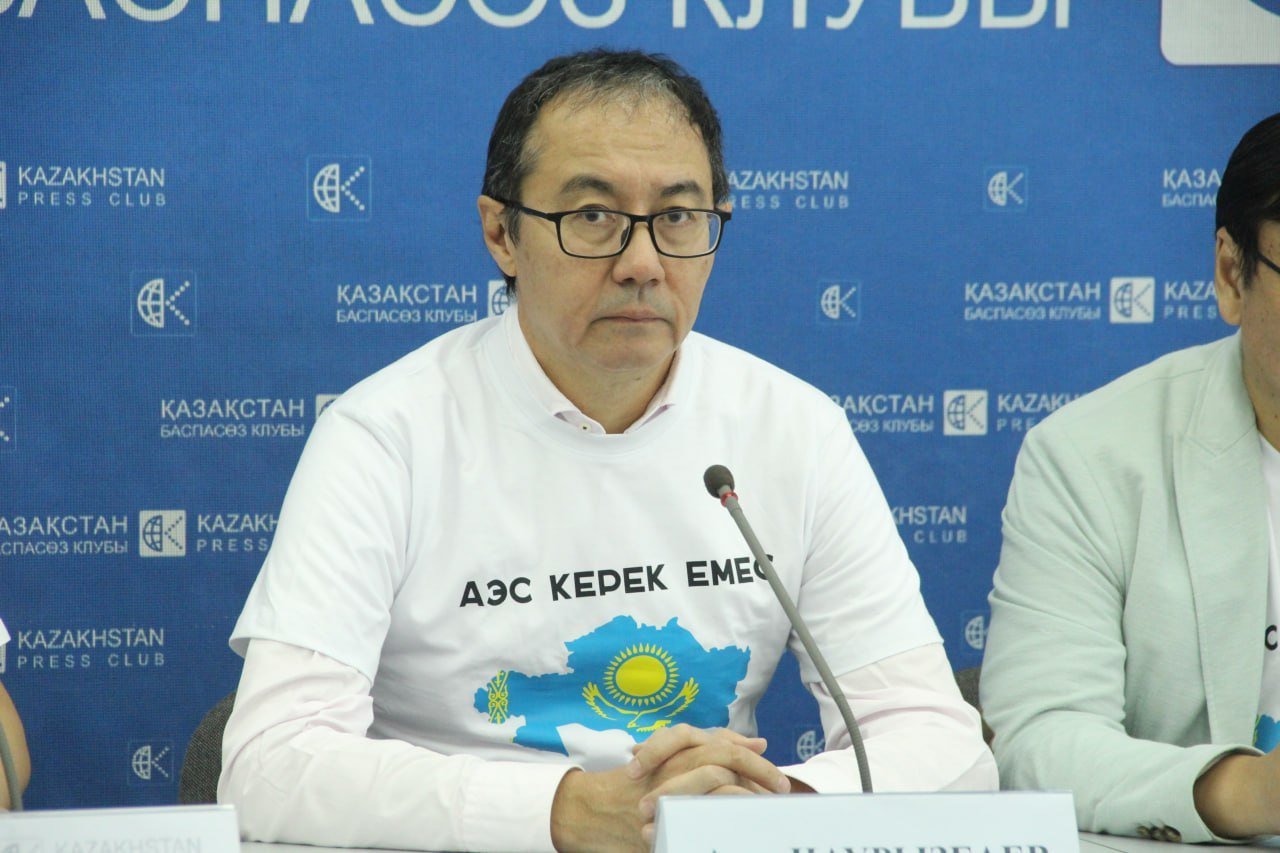
At a press conference in Almaty on September 10, Nauryzbayev avoided directly answering whether he had maintained ties with Ablyazov.
In 1999, I worked under Ablyazov. That was 25 years ago. If you are interested in facts from 25 years ago... Tell me, are you a historian? Aset Nauryzbayev responded to a journalist.
At this press conference, they announced that Nauryzbayev had officially headed the newly created public foundation of opponents of the nuclear power plant.
Later, in response to our questions, Nauryzbayev stated that his position was not politically motivated and was not financially supported.
A nuclear power plant is a project that the country does not need, which will bring me personal inconvenience in the form of overpaying for electricity, goods and services, and will also usher in the risk of losing Balkhash, the need to store radioactive waste for hundreds of years without receiving anything in return. The political subtext in this is only that some countries want to solve the matter not economically, but politically. I am not paid for my civic position, moreover, I myself spend my money and time explaining that a nuclear power plant is expensive, time-consuming, and unsafe. Economically, the issue of a nuclear power plant is not worth it at all: the price of a kilowatt-hour from it is six times higher than from renewable energy sources. Aset Nauryzbaev
For (Officially Approved Position)
Supporters of the NPP's construction who attended public hearings in various cities across Kazakhstan also appeared surprisingly well organized.
During the hearings in Astana, activists who wanted to speak out about constructing a nuclear power plant were divided into “quiet” and “loud.” Everyone who could protest was sent to a separate room with an online stream, while supporters of nuclear energy were allowed into the main hall. Students holding posters with slogans like “Say YES to AES (NPP - Ed.)” represented public opinion in Astana. Whether they came voluntarily or became the notorious administrative leverage is up for discussion.
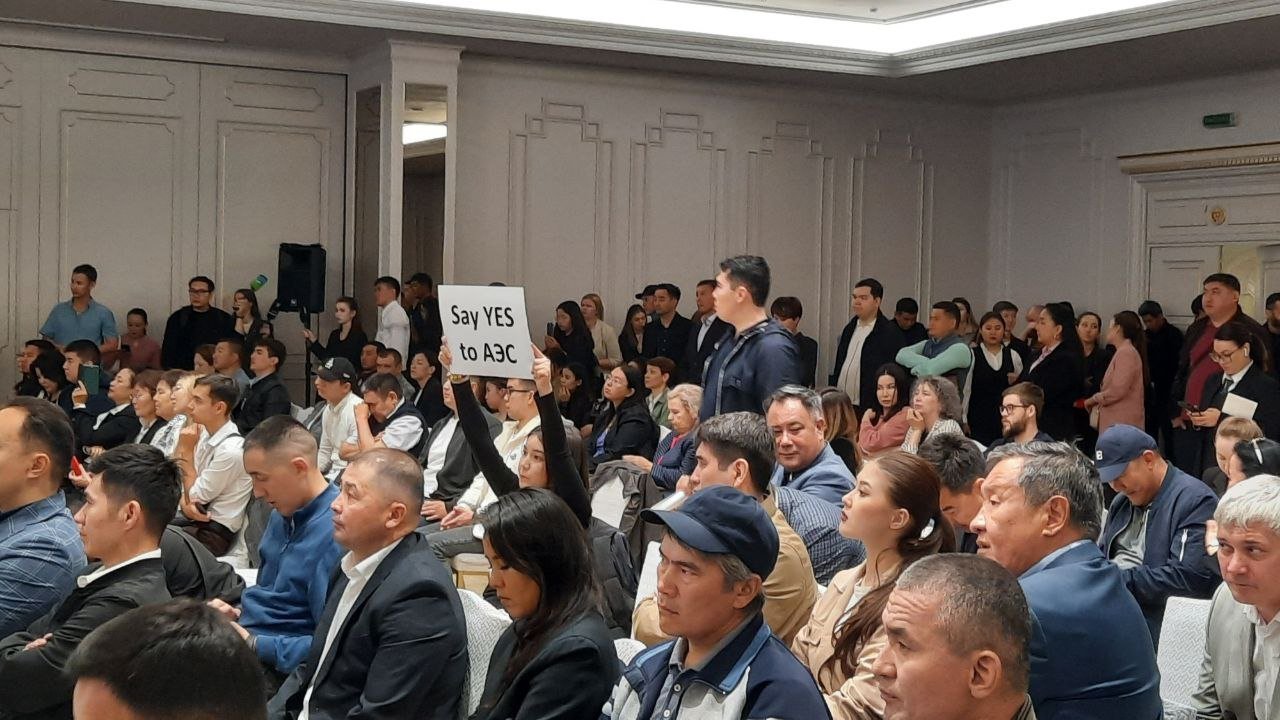
But a whole busload of activists came to the public hearings in Ulken, where supporters of nuclear energy actively spoke. We do not know who paid for this trip. One could assume that the ideological supporters rented the transport themselves to attend a meeting crucial for their cause. Such a high level of civic consciousness is suspicious, nonetheless. Getting Kazakhstanis to participate even in a residents' meeting on housing and communal services and the Property Owners' Organization is no easy task.
Experts began to speak out in support of the NPP's construction just as synchronously before the referendum. One is Olzhas Baidildinov, a member of the public council of the Ministry of Energy and creator of the Telegram channel "Baidildinov. Oil".

We asked Olzhas Baidildinov the same questions as Asset Nauryzbayev: Why does he have such a position? Does he receive any external funding? Does he see a political subtext in this issue?
Olzhas Baidildinov explained his position by saying that energy consumption is growing in all countries, and Kazakhstan is no exception. Therefore, a country with severe temperature fluctuations, a large territory, and infrastructural difficulties requires reliable energy sources, such as nuclear power plants. By 2030, Kazakhstan is predicted to have an electricity deficit of 6 GW, the equivalent of not one but two nuclear power plants.
We have an energy deficit. I have been writing about this since 2019. Perhaps, I was the first to say that Kazakhstan needs to build three NPPs, because one NPP will not cover even the needs that we have today. In December last year, we had a peak in consumption and a peak in imports - it was 9% of our energy balance. That is, we imported 9%, mainly from Russia, partly from Kyrgyzstan. If for some reason we could not buy this energy in Russia, the whole country would sit without electricity for two hours in December. This is the current situation in the energy sector, and this deficit is growing - the population is growing, industry is growing, everything is being electrified. One nuclear power plant with two power units will simply cover the deficit that we have today. To meet the growing demand, we need three stations with two power units. According to the forecast, by 2040, 25 million people will live in Kazakhstan. If we do not have enough electricity for 20 million, then how will we provide for 25 million people? Olzhas Baidildinov
Like his opponents from the opposite camp, the expert denies the suggestion that someone is directing the NPP supporters.
I saw publications about allegedly paying 500 thousand tenge to supporters of the NPP. I don't know about others, but no one paid me money for this. It just so happened that I express things that are unpleasant to someone but necessary for the economy - this concerns both the fuel market and the development of energy in general. I am also a member of a public council, so receiving money from someone to promote something is unethical for me,
said Olzhas Baidildinov .
The expert called the opinion that all generation in Kazakhstan can be provided only by renewable sources and gas completely unfounded. According to him, only two sources can provide essential - that is, round-the-clock - generation: coal and nuclear power plants.
Since coal stations are already outdated, constructing a nuclear power plant seems to be the only reliable option. Other countries, from China and the UAE to Uzbekistan and Armenia, are also opting for peaceful atoms, so Kazakhstan will not be alone. The expert also says Kazakhstan already has two nuclear reactors. One is in Aqtau. Its capacity was mainly used for water desalination. The second experimental reactor is still successfully operating in Almaty.
There is no political background here. The government will hold a tender to determine who will come to build and on what terms. It is also necessary to understand that Kazakhstan does not have the funds to build a nuclear power plant. In essence, the company that comes to build a nuclear power plant will have to attract this money and then recoup it based on the tariff. We look foolish to the whole world when, occupying first place in uranium production and second place in the world in its reserves, we do not have our own nuclear generation. It is like a shoemaker without shoes, summed up Olzhas Baidildinov.
The confrontation between supporters and opponents of nuclear energy in Kazakhstan resembles a tug-of-war: coordinated groups of activists act on both sides. It is up to the readers to decide who acts on their own initiative and who is not.
Original Authors: Nikita Drobny, Olga Ibraeva, Alexandra Mokhireva, Igor Ulitin
DISCLAIMER: This is a translated piece. The text has been modified, the content is the same. For accuracy, please refer to the original piece in Russian published on 11/09/24.
Latest news
- Foreign Minister Nurtleu Represents Kazakhstan at BRICS Summit
- Russia Approves Duty-Free Oil Supplies to Kazakhstan Through 2028
- Trump Sends Tariff Warning Letters to Global Leaders, Including Over Kazakh Imports
- Russia’s Transport Minister Roman Starovoit Dies by Suicide After Resignation
- Almaty Celebrates National Dombra Day
- Trump Threatens 10% Tariff on Countries Supporting BRICS Policies
- Why Did Kazakhstan’s President Not Attend the Azerbaijan Summit?
- Beijing Celebrates Dombra Day with Kazakh Music Performance
- Kozhamzharov’s Circle: What Are Investigators Hoping to Find?
- “I Want to Be Nazarbayev”: How Academician Yespolov’s Grandson Joined the Elbasy Clan
- Armenia Denies Russian Military Reinforcement at Gyumri
- Mayors Detained in Türkiye as Part of Fraud Investigation
- Olesya Keksel Reportedly Involved in Criminal Case Over BTA Bank Torture Allegations
- Mother of Conscript Claims Son Was Committed to Psychiatric Institution Without Consent
- President Toqayev Sends Nazarbayev Birthday Wishes
- Toqayev Appoints New Ambassadors in Series of Diplomatic Changes
- Unidentified Object Resembling Drone Found in Atyrau Region
- Trump and Zelenskyy Discuss Air Defense Needs
- Rapper Qurt: Wife Withdraws Statement in Court
- Head of Azerbaijani Cultural Autonomy in Moscow Region Reportedly Loses Russian Citizenship

